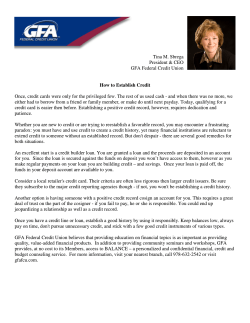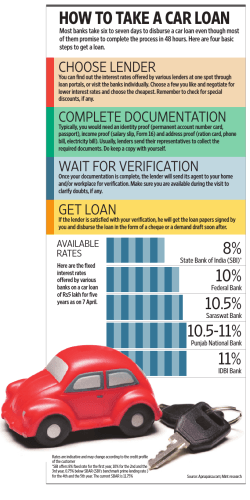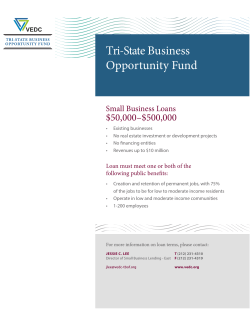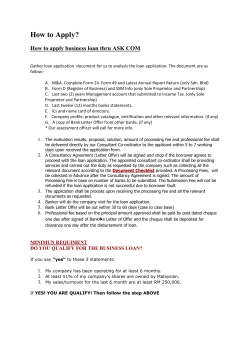
Performance Analysis of Nachanmahal Hat Branch of Sonali Bank
International Journal of Research in Management & Business Studies (IJRMBS 2015) Vol. 2 Issue 2 Apr. - June 2015 ISSN : 2348-6503 (Online) ISSN : 2348-893X (Print) Performance Analysis of Nachanmahal Hat Branch of Sonali Bank Limited Kach Mondal, IINishad Nasrin, IIITanbir Hossain, IVShangkari Bala Sarkar I Economics Discipline, Khulna University, Khulna, Bangladesh Assistant Professor, Economics Discipline, Khulna University, Khulna, Bangladesh III,IV Economics Discipline, Khulna University, Khulna, Bangladesh I II Abstract This paper examines the performance of Sonali Bank Limited (SBL), Nachanmahal Hat Branch (NHB), Jhalakati of Bangladesh. It basically conducted through using CAMEL ratings, SWOT analysis and Gap model etc. CAMEL rating is one of the widely used tools for measuring performance on basis of capital adequacy, asset quality, management capacity, earnings ability and liquidity of the financial institutions including commercial banks by the principal regulators all around the world. In this paper, it is seen that capital adequacy ratio’s score is higher than standard score. Again, two ratios titled income per employee and expenses per employee under management capacity are also higher than standard score. Diversification ratio under earning ability is 47.38 which is near to match standard score (50.00). With regard to asset quality, management capacity and earning ability in this branch has been exhibiting moderately better performance in the context of Bangladesh. Finally, with regard to liquidity, loan to deposit ratio and earning assets to deposit ratio in the branch shows excellent performance but liquid asset to total deposit ratio shows poor performance. In case of credit disbursement and collection system, the branch has been improved in the recent years. Keywords Performance measurement, CAMEL ratings system, SWOT analysis, Gap model The objective of the study is to analyze the performance of NHB of Sonali Bank Limited through CAMEL ratings system. I. Introduction The banking system plays a critical role in underpinning economic development. Money is one of the most significant and necessary elements which can be compared with blood of our body when pecuniary institution like bank act as a artery system of that body [1]. On the other hand, bank is a financial institution which deals with deposits and advances and other related services [2]. SBL explores the opportunity of getting practical banking environment for the students every year. After independence of Bangladsh, Sonali Bank emerged as the largest and leading nationalized commercial bank by proclamation of the Banks Nationalization Order 1972 (Presidential Order-26) liquidating the then National Bank of Pakistan, Premier Bank and Bank of Bhwalpur [3]. All over the world, the dimension of banking has been changing rapidly due to deregulation, technological innovation and globalization. To survive in such a competitive banking world, only theoretical knowledge in the field of banking studies is not sufficient. To cope with the changing banking environment, banks are now changing their pattern of activities delivery. Customers are mobile and they shifts from one bank to another for getting better service and in this respect banks are ranked to their clients. The main focus of this study is to analyze the banking performance of NHB through CAMEL ratings system, though it is mainly used by Central bank. The study is considered to make huge contribution not only in the field of academic research but also in helping managers to improve banking performance. An extensive comparative study of the financial performance is conducted among different year of in order to understand the current scenario of the financial health position of the branch. This study can be helpful tool for the managers to pay more attention to the aspects where these banks are lagging behind which may result in improving both their financial performance and ranking. The findings of this study may enrich the present literatures and it can help researchers in further study. This study will also pave the way of efficient and effective strategic decision making by the managers. © 2014, IJRMBS All Rights Reserved A. Review of Literature Different authors across the globe have shown financial performance of banks based on different methods and techniques of which financial ratio analysis, trend analysis, CAMEL rating, are the most common tools used. Banks play an important role in the economic development of every state [4]. This study is intended to measure the performance of selected private sector banks (five), listed on both the Dhaka Stock Exchange and Chittagong Stock Exchange, in Bangladesh through widespread use of financial ratios that mainly indicate the adequacy of the risk based capital, credit growth, credit concentration, non-performing loan position, liquidity gap analysis, liquidity ratio, return on assets (ROA), return on equity (ROE), net interest margin (NIM), etc. Elizabeth and Greg (2004) also discuss about three indicators namely, internalbased performance measured by Return on Assets, market-based performance measured by Tobin’s Q model (Price/Book ratio) and Economic-asked performance measured by economic value add has been used to measure financial performance of the some financial institution of Australia [5]. CAMELS’ rating is a managerial tool to identify those banking companies that are having problems and involve increased supervision [6]. Under this rating system, banking companies are assigned two sets of ratings- (i) performance ratings, and (ii) an overall composite rating. On the other hand authors examine that in case of the band ‘capital adequacy’, IFIC Bank’s, capital adequacy ratio and leverage ratio show better performance than EXIM Bank but in respect of return on equity and net worth protection, IFIC shows not as good as performance than the other [7]. Chowdhury (2002) analyses that the performance of banks requires knowledge about the profitability and the relationships between variables like market size, bank's risk and bank's market size with profitability [8]. The study concluded that the banking industry in Bangladesh is experiencing major transition for the last two decades. Chien 14 www.ijrmbs.com ISSN : 2348-6503 (Online) ISSN : 2348-893X (Print) International Journal of Research in Management & Business Studies (IJRMBS 2015) Vol. 2 Issue 2 Apr. - June 2015 and Danw (2004) in his study concluded that Taiwan commercial banks with higher total deposits, credits, assets, and shareholders’ equity does not always result in better profitability performance of management [9]. Siddique and Islam (2001) have shown that the commercial banks of Bangladesh are performing healthy and contributing to the economic development of the country [10]. However, Khandker (2011) examines the average profitability of all Bangladeshi banks collectively was 0.09% during 1980 to 1995 [11]. Haque (2013) discusses about financial performance of some selected private commercial banks in Bangladesh for the period 2006-2011 clarify whether any relationship exists between a bank’s years of operation and its performance [12]. On the other hand, Ahmed and Hasan (2007) compare and analyze the performance of Islamic banking and conventional banking system in Pakistan by using of financial measures [13]. Therefore, this research examines the performance of SBL through CAMEL ratings system. In the previous literature, there is lot of study about performances of banks but there is no study which uses CAMEL rating exactly about a state owned commercial bank. From the academic point of view this research will provide a new perspective in evaluating the pecuniary performance of Bangladeshi commercial banks that belongs to different generations. The findings of this study will enrich the present literature and it will help researchers in their future venture. Table 1: Ratios under CAMEL Ratings of Capital Adequacy Component Ratios Formula Standard Score (In %) Capital Capital Capital & 8 Adequacy Adequacy reserve / Total Ratio risk weighted assets×100…… (1) Return on Net profit / 30 Equity Paid up capital + free reserves ×100…………(2) NetTotal equity / 100 worth Non-performing Protection loan ×100……… (3) Source: Bangladesh Bank’s CAMEL Rating Analysis (Module 1 and 2), 2012 2. The CAMEL Ratings: Asset Quality Percentage of classified loan to total loan granted is considered as the principal ratio for measuring the quality of the assets. At this stage, the performance of the asset under deferent ratios has been shown in Table 2. II. Methodology The research is descriptive well as qualitative in nature which has mainly conducted by secondary data which have both quantitative and qualitative value so that the performance level can be well understood and measured. The paper is secondary as well as primary data base. The main sources of secondary data are annual report of SBL, different manuals of SBL, different circulars of SBL, Bangladesh Bank website, different websites, website of SBL, journals and articles. The sources of primary data are observation method. SBL is given more priority to Nalchity upazila because of this reason here three branches are located [14]. The tools for the performance of all the commercial banks under CAMEL Ratings include capital adequacy, asset quality, management standard, earnings and liquidity maintenance [15]. Table 2: Ratios under CAMEL Ratings of Asset Quality Component Asset Quality Ratios Formula % of Classified Loan Nonperforming Loan / Total Loan×10…(4) Standard Score (In %) 10 Source: Bangladesh Bank’s CAMEL Rating Analysis (Module 1 and 2), 2012 3. The CAMEL Ratings: Management Capacity The management capacity of SBL can be recognized to the number of variables, such as operating ratio, profit per employee, expenses per employee, gross earning assets to total assets etc. At this stage, the management capacity of the sample banks has been presented through two important ratios in Table 3. A. CAMEL Analysis CAMEL rating is one of the widely used tools which analyze capital adequacy, asset quality, management capacity, earnings ability and liquidity of the financial institutions including commercial banks to find out the performance and improvement capacity. Table 3: Ratios under CAMEL Ratings of Management Capacity Component Ratios Formula Standard Score Management Income Total Profit/ 0.50 Capacity per Total employee employees…(5) Expenses Total Cost /Total 0.25 per employees…(6) employee 1. The CAMEL Ratings: Capital Adequacy Capital adequacy of SBL can be deliberated by calculating a number of ratios, like capital adequacy ratio, leverage ratio return on equity and net worth protection. The ratios for the year 2004 to 2013 are given in Table 1. Source: Bangladesh Bank’s CAMEL Rating Analysis (Module 1 and 2), 2012 4. The CAMEL Ratings: Earning Ability Earning ability of SBL can be judged through a number of accounting ratios, such as net investment margin, return on assets, www.ijrmbs.com 15 © All Rights Reserved, IJRMBS 2014 International Journal of Research in Management & Business Studies (IJRMBS 2015) Vol. 2 Issue 2 Apr. - June 2015 diversification ratio, net profit margin, earnings per share, return on capital employed etc. The performance of the banks in respect of these ratios has been tabulated in Table 4. Table 6: Nature of Loan of NHB Types of AgriMeasurement cultural Loan Table 4: Ratios under CAMEL Ratings of Earning Ability Compo- Ratios Formula Standard nent Score (In %) Net Profit from 6 Earning Investment Investment / Ability Margin Total Investment × 100......(7) Net Profit Margin Diversification Ratio Profit After Tax /Total Loan & Advance× 100.......(8) Non-Interest Income / Total Income× 100 ......(9) Unclassified Loan /Standard ….. 50 Table 5: Ratios under CAMEL Ratings of Liquidity CompoRatios Formula Standard nents Score Loan to Total Loan / Total ….. Liquidity Deposit Deposit ×100…… Ratio (10) ….. Earning Asset / Total Deposit ×100…...(12) ….. Amount - - - - D. SWOT Analysis Hasan (2012) examines the SWOT analysis of Southeast Bank shows the internal and external based influential factors which link the Southeast bank positively and negatively [17]. After analysing SWOT, specific inferences can be made in matrix. The full abbreviated form of SWOT is strengths, weaknesses, opportunities and threats. 5. The CAMEL Ratings: Liquidity SBL have to pay regard to the number of factors, specifically (a) maintenance of cash reserve ratio (CRR) and statutory liquidity ratio (SLR), (b) adequate loan-deposit ratio, (c) dependence on inter-band deposit and (d) profitability. The scenario is shown in below in Table 5. Liquid Asset / Total Deposit ×100…….(11) No. of Borrowers - Which loan is not classified or not over due date (basically 1 year) If the loan is past Sub due/overdue for 1 Standard years or beyond but less than 2 years. Clas- (SS) si-fied Doubt- If the loan is past Loan ful due/overdue for 2 (DF) years or beyond but less than 5 years. Bad/ If the loan is past Loss due/overdue for 5 (BL) years or beyond Source: Sonali Bank Limited (SBL), 2013 [16] Source: Bangladesh Bank’s CAMEL Rating Analysis (Module 1 and 2), 2012 Liquid Assets to Total Deposit Ratios Earning assets to deposit ISSN : 2348-6503 (Online) ISSN : 2348-893X (Print) E. Gap Model of NHB Ghosh (2011) shows that the customer expectations are subjective assessments of actual service experience [18].The “Table 7”corresponds to two concepts: customer expectations and bank perceptions that play a major role in service. Customer expectations are the standards of or reference points for performance, against which service experiences are compared, and are often formulated in terms of what a customer believes, should or will happen. Table 7: Gap Model Perspective Perspective Expected Service Customer Gap (Brand Equity) Perceived Bank Service Source: Authors Compilation according to Ghosh, 2011 [19] Source: Bangladesh Bank’s CAMEL rating analysis (Module 1 and 2), 2012 III. Overview A. Description of Branches and Offices of SBL SBL is the largest commercial bank in bank in Bangladesh. It has large network all over the country. It has extensive network to the root level of the country. The scenario is seen in Table 8. B. Disbursement and Recovery of Loan Actually, loan performance of the SBL is composed with the yearly loan disbursement and yearly loan recovery. In this research paper, authors used the information of loan disbursement and loan recovery of year 2009 to 2013. C. Nature of Loan As a loan based branch, there are huge number of borrowers of agriculture loan in NHB. Therefore, the detailed about the agricultural loan are given in Table 6. © 2014, IJRMBS All Rights Reserved 16 www.ijrmbs.com ISSN : 2348-6503 (Online) ISSN : 2348-893X (Print) Table 8: Branches and Subsidiaries Offices of SBL S e r i a l Particulars No. 01. Total No of Branches i) No. of foreign branches ii) No. of local branches a) No. of Rural Branches b) No. of Rural Branches 02. No of Regional Offices 03. No of Principal Offices 04. International Journal of Research in Management & Business Studies (IJRMBS 2015) Vol. 2 Issue 2 Apr. - June 2015 No of G.M. Offices covered 93.38%. The other type of deposits is covered very low percentage of total deposit. No. C. Composition of Total Assets There are four type of asset in this branch and from those assets, loan and advance are covered 95.92% of total asset. The others asset like cash is covered 2.96%, fixed asset is covered 0.90% and other assets are covered. 1204 2 1202 858 344 19 42 Table 10: Composition of Total Assets Name of Asset Amount in BDT Loan And Advance 12,95,69,214 Cash 40,76,412 Fixed Asset 10,16,103 Other Asset 3,73,978 Total 13,50,35,707 10 Source: Sonali Bank Limited (SBL), 2013 [20] Nachanmahal Hat Branch is one of the most important branches, which was opened in the year of 1979 by the head office of SBL to assist the rural people of Nalchity upazilla of Jhalakati district. On that time, mainly agricultural loan disbursement was the main duty of this branch though other some general banking work also opened to help the rural people. At present both general banking and agricultural loan and advance are two dominating work of this branch. It is also an exceptional branch of SBL because here total loan and advance are more than total deposit [21]. Table 9: Basic Information about NHB Serial Particulars Year No. 01. Year of Establishment 02. Number of employees 2013 03. Total Deposit 2013 04. Total Loan and Advance 2013 05. Profit after tax 2013 Percentage 95.92 2.96 0.90 0.22 100 Source: Annual Report of NHB, 2013 [24] D. Composition of Total Liabilities There are five types of liabilities in this branch and from those liabilities; total deposit is covered 69.16% in 2013 of total liabilities. The scenario is given below: No. 1979 6 10,74,46,548 12,95,69,214 6,15,342 Source: Annual Report of NHB, 2013 [22] Fig. 2: Composition of Total Liabilities in Percentage B. Composition of Deposits Deposit is one of the major factors of bank which ensures performance and profitability of bank. The Fig. 1 shows the composition of total deposit of NHB. Source: Annual Report of NHB 2013 [25] In Fig. 2, it shows that the inter branch transaction is covered 27.47% of total liabilities which is the second position and others are in very tiny in size in 2013. E. Comparison between Unclassified and Classified Loan In the Fig.3, it shows that in this branch 87% loan are unclassified that means 87% loan are not over their due period and only 13% loan are classified that means 13% loan are exceeded their due period. Fig.1: Composition of Total Deposit in Percentage Source: Annual Report of NHB, 2013 [23] In the year of 2013, the percentage of time deposit achieved the maximum percentage of total deposit where time deposit is www.ijrmbs.com Fig.3: Comparisons between Unclassified Loan and Classified 17 © All Rights Reserved, IJRMBS 2014 International Journal of Research in Management & Business Studies (IJRMBS 2015) Loan Source: Annual Report of NHB, 2013 [26] It is a good sign for any branch of any bank where number of borrowers are engaged in agriculture and they are benefited by the help of rural credit and also maximum of them do not late pay their loan. 2011 2010 2009 10.5 10.24 9.82 9.33 10.9 A 2009 2010 2011 N.B.: A stands for average score (In percentage) and S stands for sstandard Score (In percentage. S D. Earning Ability The net profit margin of the branch (score 0.61) is much better, there no standard score is selected. But throughout the years, profit after tax with respect to loan and advance percentage shown about to same result. 8 Table 14: Earning Ability (In Percentage) 30 Name of 2013 2012 Ratio Net Investment Margin - 100 Net Profit Margin Diversification Ratio Table 15: Liquidity (In Percentage) 2012 S Income 1.38 1.10 1.12 1.15 1.12 1.17 0.50 per Employee Expenses 1.40 1.41 1.30 1.44 1.44 1.40 0.25 per Employee Source: Annual Report for the periods, 2009-2013 [29] A. Capital Adequacy It is evident from Table 11 that NHB of SBL has achieved a better result than the standard in relation to capital adequacy. Where the standard score is 8 but the average score of five years is 10.47. With regard to return on equity, branch has shown a poor result (score 17.58) which is far behind the standard (score 30.0). As to net worth protection, branch has shown a tremendous growth in the performance in the later years although the average performance is inferior (score 65.55) to the standard (score 100). 2013 2012 2013 Table 13: Management Capacity (In Percentage) Name of A Ratios IV. Analysis and discussion Name of Ratio Capital Adequacy Ratio ISSN : 2348-6503 (Online) ISSN : 2348-893X (Print) Vol. 2 Issue 2 Apr. - June 2015 [ Return on Equity 19.9 Net-worth Protection 77.7 18.0 72.9 11.76 77.63 15.44 33.76 22.8 65.77 10.16 17.58 65.55 2010 2009 A S - - - - 6 0.54 0.55 0.65 0.77 0.55 0.61 -- 34.5 33.54 45.32 65.21 58.32 47.38 50 Source: Annual Report for the periods, 2009-2013 [30] Source: Annual Report for the periods, 2009-2013 [27] N.B.: A stands for average score (In percentage) and S stands for sstandard Score (In percentage). N.B.: A stands for average score (In percentage) and S stands for sstandard Score (In percentage). Finally, with respect to diversification ratio, the performance of branch is below than the standard score. The average (score 47.38) is close to standard (score 50.0). Therefore, the difference between non-interest income and total income is in standard form. B. Asset Quality For Asset quality level, Table 12 shows that NHB Branch of SBL has demonstrated stronger position (score 5.97) than the standard score (10.0). Table 12: Asset Quality of NHB of SBL (In Percentage) Name of 2013 2012 2011 2010 2009 A Ratio percent- 6.33 5.77 7.23 4.76 5.77 5.97 age of Classified Loan 2011 E. Total Income and Expenditure of the NHB In the Fig. 4, it shows the total income and expenditure of the Branch. It is also shown the earning trend of those selected years. In his chart, both income and expenditure are increased year by year. Where the amount of expenditure of this branch is always less than the income of this branch that means the branch is made an average level of profit every year. S 10 Source: Annual Report for the periods, 2009-2013 [28] The percentage of classified loan is less than the unclassified loan in this branch. C. Management Capacity It is revealed from the Table 13 that with regard to profit per employee, branch demonstrated an outstanding performance as compared to the standard score. However, as to comparative performance between the two ratios, the difference is not so high through the years from 2009 to 2013. © 2014, IJRMBS All Rights Reserved Fig. 4: Total Income and Expenditure of NHB Source: Annual Report for the periods, 2009-2013 [31] F. Liquidity In case of NHB of SBL, loan to deposit ratio (score 134.99) is in 18 www.ijrmbs.com ISSN : 2348-6503 (Online) ISSN : 2348-893X (Print) International Journal of Research in Management & Business Studies (IJRMBS 2015) Vol. 2 Issue 2 Apr. - June 2015 better position and the deference between loan and deposit are decreased throughout the years. As per as liquid assets to total deposit is concerned, the performance of the branch seems to the very strong as the score is 36.84 but the average earning assets to deposit ratio of branch is 110.03. Name of 2013 2012 2011 2010 2009 A Ratio LD 111.32 123.43 143.55 144 152.65 134.99 LT 31.33 32.76 44.54 43.23 32.33 36.84 ED 108.54 121.76 101.12 108.54 110.20 110.03 Source: Annual Report for the periods, 2009-2013 [32] N.B.: A stands for average score (In percentage), LD = Loan to Deposit Ratio, LT = Liquid Assets to Total Deposit, Ratios and ED = Earning assets to deposit. Fig. 5: Deposits and Loan-advances of NHB Source: Annual Report for the periods, 2009-2013 [33] In the Fig. 5, it indicates the comparison between total deposit and total loan and advance of the Nachanmahal Hat Branch of SBL in the years. In recent year, the difference is lower than the past years. Thus, it is a better sign for the branch that the difference is getting low year by year. G. Nature of Loan There is huge amount of classified loan in relation to unclassified loan in NHB. In Table 16, it shows the figure of NHB where no sub standard and doubtful loan are shown. Table 16: Different Types of Loan of NHB Year Unclassified loan Number Amount in BDT 2013 3945 10,34,45,843 Classified loan Sub Standard (SS) No. Amount in BDT - 2012 2011 2010 2009 4132 3890 4015 4187 10,90,54,760 10,09,87,098 10,69,02,765 11,33,54,000 - - Doubtful (DF) No. Amount in BDT - 1125 1,60,30,775 - 1023 1411 1209 1298 1,55,76,887 1,97,80,343 1,45,76,098 1,99,01,234 - Bad/loss (BL) No. Amount in BDT Source: Annual Report for the periods, 2009-2013 [34] H. Disbursement and Recovery of Loan Rural Credit (RCD), micro credit (MCD), small business loan and over draft (OD) loan are the main four method of disbursing loan. In case of RCD, disbursement amount is lower in 2013 compare with 2009 which is shown in “Table 17” though the amount of recovery is growing up and recent year the disbursement amount is always lower than the recovery amount. In case of MCD, the volume of disbursement and recovery amount is low like small business loan. In case of OD loan, the volume of disbursement is exceeded the targeted volume. Table 17: Comparative Analysis of Disbursement and Recovery of Loan Year RCD MCD Small Business OD D R D R D R D R 2013 27,73,000 70,35,000 1,09,000 3,09,000 - 50,800 5,00,500 2,90,000 2012 75,98,000 32,30,000 45,600 2,09,000 54,000 1,00,700 - 1,66,000 2011 43,55,000 42,66,000 75,000 3,00,900 2,56,000 23,000 1,65,000 3,00,500 2010 38,88,000 55,89,000 1,50,900 1,86,000 1,08,900 45,000 3,37,000 4,55,000 2009 95,65,700 40,45,000 4,76,000 5,80,000 - 34,000 87,000 2,05,000 Source: Annual Report for the Periods, 2009-2013 [35] N.B.: D stands for Disbursement and R stands for Recovery www.ijrmbs.com 19 © All Rights Reserved, IJRMBS 2014 International Journal of Research in Management & Business Studies (IJRMBS 2015) Vol. 2 Issue 2 Apr. - June 2015 ISSN : 2348-6503 (Online) ISSN : 2348-893X (Print) I. SWOT Analysis of NHB SWOT analysis gives an organization an insight of what they can do in future and how they can compete with their existing competitors. Table 18: SWOT Analysis of NHB Strengths i. A good number of experienced bankers in its management. ii. The numbers of agricultural loan borrowers are more than other bank in our country. iii. Online service is also available in this branch. iv. Have proactive & efficient management. v. Have ability to reach the root level of the country. vi. Reliable Service Weaknesses i. Some of the activities of branch are maintained by manually. ii. People do not get better facility as a branch of government bank than that they get in private commercial bank. iii. Low remuneration package. iv. Lack of modern information technology being practiced. v. There is no ATM booth of this branch of SBL. vi. Lack of knowledge at software execution. Opportunities i. People are interested in getting agricultural loan, microcredit, SME loan, personal loan with lower interest rate. ii. High contribution in rural development iii. Money transfer easily in any branches of Bangladesh. iv. Great facility of disbursing loan in rural area. Threats i. Political influence over the high level management which causes corruption in branch. ii. Many banks offer different type of product that people like than this branch, actually SBL. iii. The employees take more time to work that people dislike, so their customers may decrease in future. iv. Low amount transactions are high so that there is unnecessary work load. Source: Authors Compilation based on observation, 2015 This lack of knowledge of the customers creates problems for SBL. They think their inability as SBL’s poor service. J. Gap Model of NHB The four basic criteria of Gap model of NHB are discussed below which shows the customer expectation and bank perception relationship Gap 4: Not Matching Performance to Promises SBL does not ‘over promise’ to its customers. It also has a good horizontal communication between its important functional divisions like loan section, customer relations, and IT. Therefore, there is no gap under these criteria. Gap 1: Not Knowing What Customers Expect SBL does not do extensive research on a continuous basis. Though there is bottom-up communication, which is planned for enabling SBL to better understand what customers expect, the total process is efficient enough to result impressive performance from their service. For example, in NHB, the customer service officer was gone under training and then the customers faced problems and asked for customer service help but most of the trainings are inhouse, which is a barrier to make the customer service officers more efficient. V. Concluding Remarks A. Findings The study has conducted on Nachanmahal Hat Branch of Sonali Bank Limited. From the study the researcher has found some major findings. The Bank has diversified product line and gives preferences to its local customer through its business strategies. In the NHB of Sonali Bank Limited has shown a better result in case of capital adequacy ratio in compare to recent year with the past years. On the other hand, return on equity and net worth protection both are in poor condition in this branch, net profit is relatively lower than the paid up capital and free reserve. Amount of non-performing loan is higher than the total equity. Asset quality of NHB is in stronger position than standard rating because in this branch number of classified loan or non-performing loan is comparatively lower than the unclassified loan. Management capacity in NHB is reliable rather than any other element of banking. From the year of 2009 to year 2013, the performance of employees income are increasing and also the expenses per employee are decreasing. Loan and advances is 95.92% of 100% assets at all. The total net amount of asset is BDT 13, 50, 35, 707 at all. Total deposit is 69.16% in 2013 of total assets. In the loan picture, classified loan and unclassified loan are BDT 1, 60, 30, 775 and 10, 34, 45, 843 at all. Profit after tax and total loan and advances clears the result of NHB of SBL about the earning ability. Also the relationship between non-interest income and Gap 2: Not Selecting the Right Service Designs and Standards From practical observations, researcher found few areas that he identified as gap 2. From the observed many customers, who had to come a long way to complain about Internet Password or SME loan, foreign remittance. This can affect the Bank Image a great deal, being dissatisfying hassle for the customers. Moreover at the time of attending a new customer, complains or dissatisfaction from an existing customer can harm the bank image. Gap 3: Not Delivering to Service Standards This gap is also insignificant at NHB of SBL. This gap is very important, because it occurs when a company sets a standard but not deliver as per the standard. From observation, some areas of gap 3 are: It takes too much time for TT sending and foreign remittance downloading. The information centre of SBL lacks capacity. It is very much time consuming to avail service there. But such services are expected to be availed at a least possible time. At NHB, many of the SBL customers are not well educated. They are not equipped enough to handle the mobile phone appropriately or use Internet. © 2014, IJRMBS All Rights Reserved 20 www.ijrmbs.com ISSN : 2348-6503 (Online) ISSN : 2348-893X (Print) International Journal of Research in Management & Business Studies (IJRMBS 2015) Vol. 2 Issue 2 Apr. - June 2015 Case Study on Janata Bank Limited, Bangladesh Research Publications Journal, 7(4), 2012, 428-436. [4] R. A. Karim, and T. Alam, An Evaluation of Financial Performance of Private Commercial Banks in Bangladesh: Ratio Analysis, Journal of Business Studies, 5(2), 2013, 5465. [5] D. Elizabeth and E. Greg, Efficiency Customer Service and Financial Performance Among Australian Financial Institutions, International Journal of Bank Marketing, 22(5), 2004, 319-342. [6] K. Rehman, and I. Saba, Gauging, The Financial Performance of Banking Sector Using CAMEL Model: Comparison of Conventional, Mixed and Pure Islamic Banks in Pakistan, International Research Journal of Finance and Economics, 82, 2012. [7] M. A. Kabir, and S. Dey, Performance Analysis through CAMEL Rating: A Comparative Study of Selected Private Commercial Banks in Bangladesh, Journal of Politics and Governance, 1(2/3), 2012, 16-25. [8] A. Chowdhury, Politics, Society and Financial Sector Reform in Bangladesh, International Journal of Social Economics, 29(12), 2002, 963-988. [9] T. Chien, and S. Z. Danw, Performance Measurement of Taiwan Commercial Banks, International Journal of Productivity and Performance Management, 53(5), 2004, 425-434. [10] S. H. Siddique, and A. F. M. M. Islam, Banking Sector in Bangladesh: Its Contribution and Performance, Journal of Business Research, 3(1), 2001, 1-25. [11] R. A. Karim, and T. Alam, An Evaluation of Financial Performance of Private Commercial Banks in Bangladesh: Ratio Analysis, Journal of Business Studies, 5(2), 2013, 5465. [12] S. Haque, The Performance Analysis of Private Conventional Banks: A Case Study of Bangladesh, IOSR Journal of Business and Management, 12(1), 2013, 19-25. [13] NHB, Annual Report of Nachanmahal Hat Branch of SBL(2009, 2010, 2011, 2012, 2013)’, Nachanmahal Hat Branch, Sonali Bank Limited, Finance Division, Ministry of Finance, Government of the People’s Republic of Bangladesh, Dhaka, 2013. [14] SBL, Branches & Subsidiaries Offices of SBL, Sonali Bank Limited (SBL), Dhaka, 2013. [15] M. A. Kabir, and S. Dey, Performance Analysis through CAMEL Rating: A Comparative Study of Selected Private Commercial Banks in Bangladesh, Bangladesh Bank, Journal of Politics and Governance, 1(2/3), 2012, 16-25. [16] SBL, Branches and Subsidiaries Offices of SBL, Sonali Bank Limited (SBL), Dhaka, 2013. [17] G. M. Hasan, Measuring Customer Satisfaction Level of Credit Cardholders of Southeast Bank Limited, Unpublished MBA Internship Paper, BRAC Business School, BRAC University, Dhaka, 2012. [18] S. Ghosh, Performance Analysis and Customer Satisfaction of Uttara Bank Limited: A Study on Tipusultan Road Branch, Unpublished MBA Internship Paper, Business Faculty, Jaganath University, Dhaka, 2011. [19] S. Ghosh, Performance Analysis and Customer Satisfaction of Uttara Bank Limited: A Study on Tipusultan Road Branch, Unpublished MBA Internship Paper, Business Faculty, Jaganath University, Dhaka, 2011. total income shows the standard result in the year from 2009 to 2013. Though there is no standard in CAMEL rating analysis of liquidity measurement but the liquidity condition of NHB of SBL have a decent figure. The amount of total loan and advance is higher than the total amount of deposit. Therefore, it is a good sign for the branch. Capital adequacy ratio is 10.16 where the standard ratio is 8 at all. On the other hand, returns on equity and net-worth protection ratio are not satisfactory in this paper. Earning assets are also higher than deposit of the branch. In NHB all the classified loans are treated as bad/loss loan though the percentage of classified loans are low which is only about 13%. The performance of recovery of RCD loan is increasing yearly when the amount of recovery of loans was BDT 40, 50,000 in 2009 but in 2013 the amount of recovery loans are increased. On the other hand, the recovery of MCD, small business, OD is better position over those years in compare with its disbursement. Though NHB of SBL has been started online banking system for providing better service to the customers but, the online bank is not implied in all the branch of SBL. Having manual and online banking at the same time, the bank sometime find some problem to do their inter branch activities. The accountability is working in the SBL. Every day they have finished their transaction and if there is any miss match, the employees have to explain it and even have to pay it, so the condition of transparency is good here. B. Conclusion Sonali Bank Ltd. is providing and maintaining pleasant working environment for delivery of better quality services to maintain edge over the competitors. Due to radical changes in the banking sector in the recent years, the central banks of all around the world have improved their supervision quality and techniques. In evaluating the function of the banks, many of the developed countries are now following uniform financial rating system along with other existing procedures and techniques. CAMEL rating is a supervisory tool to recognize those banking institution that are having problems and require increased supervision. Bangladesh Bank is also following the above techniques in respect of evaluating scheduled Commercial banks. Keeping these developments in view, this paper has applied CAMEL Ratings techniques for assessing financial strength of NHB of SBL. The study will help managers to pay more attention to the aspects where these banks are lagging behind which may result in improving both their financial performance. From the academic point of view this research will provide a new perspective in evaluating the pecuniary performance of Bangladeshi commercial banks that belongs to different generations. The findings of this study will enrich the present literature and it will help researchers in their future venture. This study will also pave the way of efficient and effective strategic decision making by the managers. So, all the concern section should be more prompt and efficient to compete with the challenging opportunities of the future. References [1] A. Khandker, (2011). Commercial Banking in Developing Economy: A Case Study of Ten Private Commercial Banks of Bangladesh, ASA University Review, 5(1), 2011. [2] M. K. Roy, and S. H. Khan, Study on Private Commercial Banks in Bangladesh, ASA University Review, 7(1), 2013, 165-187. [3] M. Z. Hossain, A. Hossain, D. Kumar, S. M. Hasan, M. F. Islam, Financial Performance Analysis of NCBs in Bangladesh: A www.ijrmbs.com 21 © All Rights Reserved, IJRMBS 2014 International Journal of Research in Management & Business Studies (IJRMBS 2015) Vol. 2 Issue 2 Apr. - June 2015 [20] SBL, Branches & Subsidiaries Offices of SBL, Sonali Bank Limited (SBL), Dhaka, 2013. [21] NHB, Annual Report of Nachanmahal Hat Branch of SBL(2009, 2010, 2011, 2012, 2013), Nachanmahal Hat Branch, Sonali Bank Limited, Finance Division, Ministry of Finance, Government of the People’s Republic of Bangladesh, Dhaka, 2013. [22] NHB, Annual Report of Nachanmahal Hat Branch of SBL(2009, 2010, 2011, 2012, 2013), Nachanmahal Hat Branch, Sonali Bank Limited, Finance Division, Ministry of Finance, Government of the People’s Republic of Bangladesh, Dhaka, 2013. [23] NHB, Annual Report of Nachanmahal Hat Branch of SBL(2009, 2010, 2011, 2012, 2013), Nachanmahal Hat Branch, Sonali Bank Limited, Finance Division, Ministry of Finance, Government of the People’s Republic of Bangladesh, Dhaka, 2013. [24] NHB, Annual Report of Nachanmahal Hat Branch of SBL(2009, 2010, 2011, 2012, 2013), Nachanmahal Hat Branch, Sonali Bank Limited, Finance Division, Ministry of Finance, Government of the People’s Republic of Bangladesh, Dhaka, 2013. [25] NHB, Annual Report of Nachanmahal Hat Branch of SBL(2009, 2010, 2011, 2012, 2013), Nachanmahal Hat Branch, Sonali Bank Limited, Finance Division, Ministry of Finance, Government of the People’s Republic of Bangladesh, Dhaka, 2013. [26] NHB, Annual Report of Nachanmahal Hat Branch of SBL(2009, 2010, 2011, 2012, 2013), Nachanmahal Hat Branch, Sonali Bank Limited, Finance Division, Ministry of Finance, Government of the People’s Republic of Bangladesh, Dhaka, 2013. [27] NHB, Annual Report of Nachanmahal Hat Branch of SBL(2009, 2010, 2011, 2012, 2013), Nachanmahal Hat Branch, Sonali Bank Limited, Finance Division, Ministry of Finance, Government of the People’s Republic of Bangladesh, Dhaka, 2013. [28] NHB, Annual Report of Nachanmahal Hat Branch of SBL(2009, 2010, 2011, 2012, 2013), Nachanmahal Hat Branch, Sonali Bank Limited, Finance Division, Ministry of Finance, Government of the People’s Republic of Bangladesh, Dhaka, 2013. [29] NHB, Annual Report of Nachanmahal Hat Branch of SBL(2009, 2010, 2011, 2012, 2013), Nachanmahal Hat Branch, Sonali Bank Limited, Finance Division, Ministry of Finance, Government of the People’s Republic of Bangladesh, Dhaka, 2013. [30] NHB, Annual Report of Nachanmahal Hat Branch of SBL(2009, 2010, 2011, 2012, 2013), Nachanmahal Hat Branch, Sonali Bank Limited, Finance Division, Ministry of Finance, Government of the People’s Republic of Bangladesh, Dhaka, 2013. [31] NHB, Annual Report of Nachanmahal Hat Branch of SBL(2009, 2010, 2011, 2012, 2013), Nachanmahal Hat Branch, Sonali Bank Limited, Finance Division, Ministry of Finance, Government of the People’s Republic of Bangladesh, Dhaka, 2013. [32] NHB, Annual Report of Nachanmahal Hat Branch of SBL(2009, 2010, 2011, 2012, 2013), Nachanmahal Hat Branch, Sonali Bank Limited, Finance Division, Ministry of Finance, Government of the People’s Republic of Bangladesh, © 2014, IJRMBS All Rights Reserved ISSN : 2348-6503 (Online) ISSN : 2348-893X (Print) Dhaka, 2013. [33] NHB, Annual Report of Nachanmahal Hat Branch of SBL(2009, 2010, 2011, 2012, 2013), Nachanmahal Hat Branch, Sonali Bank Limited, Finance Division, Ministry of Finance, Government of the People’s Republic of Bangladesh, Dhaka, 2013. [34] NHB, Annual Report of Nachanmahal Hat Branch of SBL(2009, 2010, 2011, 2012, 2013), Nachanmahal Hat Branch, Sonali Bank Limited, Finance Division, Ministry of Finance, Government of the People’s Republic of Bangladesh, Dhaka, 2013. [35] NHB, Annual Report of Nachanmahal Hat Branch of SBL(2009, 2010, 2011, 2012, 2013), Nachanmahal Hat Branch, Sonali Bank Limited, Finance Division, Ministry of Finance, Government of the People’s Republic of Bangladesh, Dhaka, 2013. 22 www.ijrmbs.com
© Copyright 2026









